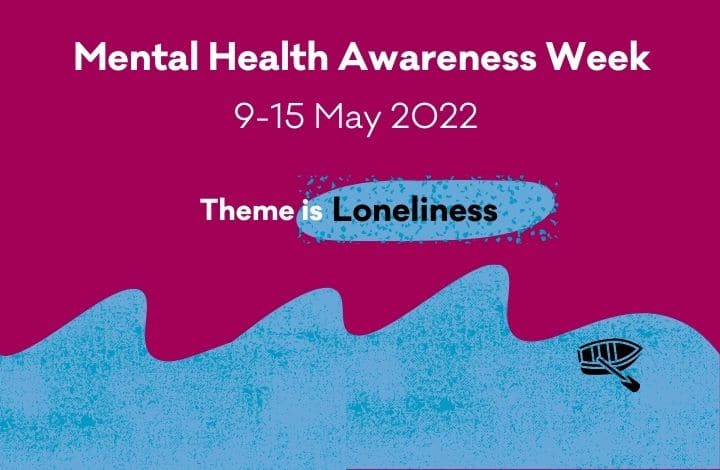Monday 9 May to Sunday 15 May 2022 plans to raise awareness of the impact of loneliness on our mental wellbeing and the practical steps we can take to address it. Reducing loneliness is a major step towards a mentally healthy society.
Mark Rowland, Chief Executive of the Mental Health Foundation, said: “Loneliness is affecting more and more of us in the UK and has had a huge impact on our physical and mental health during the pandemic. That is why we have chosen it as our theme for Mental Health Awareness Week 2022.”
With loneliness, comes stress, anxiety and depression. These three are classed as neurotic mental illnesses, which is the most common mental illness within the UK affecting 1 in every 4 people.
What is loneliness?
Loneliness is a subjective feeling about the gap between a person’s desired levels of social contact and their actual level of social contact. It refers to the perceived quality of the person’s relationships. Loneliness is never desired and lessening these feelings can take a long time.
Loneliness affects millions of people in the UK every year and is a key driver of poor mental health. The Foundation’s Mental Health in the Pandemic research has found that loneliness has been exacerbated by the Covid pandemic. The Foundation has been tracking loneliness levels in the UK during the pandemic and found the experience has been much higher with devastating impact. Loneliness has been an important factor contributing to higher levels of distress, resulting from people’s sense of isolation and reduced ability to connect with others. Further polling also found that loneliness was one of the leading issues that the public felt needed to be addressed. Loneliness can also be attributed to internal factors such as low self-esteem.
Influencing factors of loneliness?
When we think about loneliness, we often relate this to the older generation with contributing factors to loneliness include situational variables such as physical isolation, moving to a new location, relationship breakdown and changing schools for children. The death of someone significant in a person’s life can also lead to feelings of loneliness.
However, anyone can experience loneliness especially now with more people working from home with sometimes no to little communication and interaction.
One of the ‘5 ways to wellbeing’, is connect.
We took to asking a handful of OMG staff what their teams are doing to stay connected when working in a hybrid situation.
Sarah Jopson, Head of Marketing and Communications: “On top of a weekly check-in as a whole team and weekly 1-2-1’s with line managers, we also have a check-in called ‘wellbeing Wednesday’ where we, whether together at Bank Top Farm or remotely if we can’t make it in, give a rating on how each of us feels (1-10) so we can air any concerns or frustrations or celebrate achievements for feeling good.”
Rosie Barton, Wellbeing Lead, Whitehouse Surgery: “We have tried to do a couple of things to combat isolation and loneliness for both our patients and staff.
We organised a ‘wellbeing walk’ during the winter months and ran a competition for the best bobble hat which encouraged staff to get out and not eat lunch alone in their clinical room.
Myself and my colleague Debi have started to put together a presentation on the importance of staying connected for patients in our PCN with mobility issues.
In addition, we have organised Saturday coffee mornings (1 per month) with a different guest speaker each time (incl. Carers MK, Seedlings Children Centre & Healthwatch MK). We have a had a good number of patients come along and have given feedback on how nice it has been to interact with others face to face rather than virtually.”
Laurie Fryer, Payroll Manager: “I work from home full time due to disabilities and being a full time wheelchair user and can’t travel without assistance. This makes developing and maintaining work relationships and friendships so much more important as I can feel a little isolated sometimes even without lockdown!
Zoom has been a lifesaver for me, I have a morning and an evening quick zoom call with Galina (our payroll administrator) most days. We use it in the same way as that time where you make a coffee together at the office kitchen and chat about the previous evening and what you have planned for the day. I think seeing each other on screen and sharing some time together is vital for a good working relationship. Our group HR zoom calls are such good fun and a great way for us all to catch up.
I also much prefer picking up the phone and speaking to a colleague when they have a query or a question rather than emailing!”
OneWellness Clubs in Harrogate are firm supporters of Mind so we are sharing top tips from their website on how to combat loneliness:
Take it slow
If you’ve felt lonely for a long time, even if you already know lots of people, it can be terrifying to think about trying to meet new people or opening up to people for the first time. But you don’t need to rush into anything.
Try peer support
There are many different types of peer support service, which provide people with a space to use their own experiences to help and support each other, including experiences of loneliness and related mental health problems.
Make new connections
If you are feeling lonely because of a lack of satisfying social contact in your life, you could try to meet more, or different people.
• Try to join a class or group based on your hobbies or interests. This could include online groups if you can’t attend things in person. See our page of useful contacts for ways to find groups that interest you.
• If you are able to, volunteering is a good way of meeting people. Helping others can also really help improve your mental health. It is also a good idea to check that you will receive adequate support from the organisation you are volunteering at. See our page of useful contacts for organisations that can help you find local volunteering opportunities.
Try to open up
You might feel that you know plenty of people, but what is actually wrong is that you don’t feel close to them, or they don’t give you the care and attention you need.
In this situation it might help to open up about how you feel to friends and family.
If you don’t feel comfortable opening up to the people you know, you could try speaking with a therapist or a using a peer support service.
Talking therapies
Talking therapies allow you to explore and understand your feelings of loneliness and can help you develop positive ways of dealing with them.
For example, therapy can provide a space for you to discuss the emotional problems that make it hard for you to form satisfying relationships.
Look after yourself
Feeling lonely can be very stressful and can have a big impact on your general wellbeing, which might make it even harder to make positive steps to feeling better.
Think about how some of the following are affecting how you feel and whether you can do anything to change them:
• Try to get enough sleep. Sleeping too little or too much can have a big impact on how you feel.
• Think about your diet. Eating regularly and keeping your blood sugar stable can make a difference to your mood and energy levels.
• Try to do some physical activity. Exercise can be really helpful for your mental wellbeing, and some people find it helps improve their self-esteem. See our pages on physical activity and mental health for more information.
• Get outside. Spending time in green space can help your wellbeing.
• Spend time with animals. Some people find spending time around animals can help with feelings of loneliness, whether through owning a pet or spending time around animals in their natural environment. If it is possible where you live, you could try visiting a local community or city farm – the organisation Social Farms and Gardens has a list of outdoor community projects across the UK, many of which have animals available to the public.
• Avoid drugs and alcohol. While you might want to use drugs and alcohol to cope with difficult feelings about yourself, in the long run they can make you feel worse and can prevent you from dealing with underlying problems.
Be careful when comparing yourself to others
It is very hard to stop comparing ourselves to others. We all do it, but it can help to just be aware that things are not always what they seem from the outside.
For example, on social media, we very often only see what other people want to share about their lives, and this can make us feel like we are the only ones feeling lonely. It’s important to remind yourself that you don’t know how other people feel when they are alone, or when their social media feeds are turned off.
We can all experience loneliness. Let’s tackle loneliness together.









